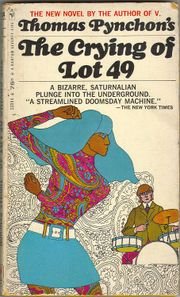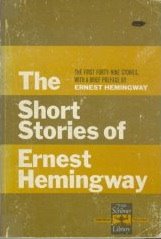 In college, an old philosophy professor took me into the library. He stopped in an aisle between rows and rows of books, pointed, and said, "To read every one of these books, in this aisle alone, would take a lifetime." He was slightly exaggerating, but his point was clear. There's simply too much in this world to see, to do, to read, so you have to make choices. We make our choices based on what other people say, most times. Recommendations from friends, newsletters, authors we like, even, God forbid, the Amazon recommendation page (come on, you know what I mean). And it's not only books, but movies and drawrings and plays and everything else under the sun. We're all critics now, too, of everything, given the fact that we can write reviews and recommend things we like, and it's easier for us to narrow down what we like based on shared interests in someone's profile. But I digress.
In college, an old philosophy professor took me into the library. He stopped in an aisle between rows and rows of books, pointed, and said, "To read every one of these books, in this aisle alone, would take a lifetime." He was slightly exaggerating, but his point was clear. There's simply too much in this world to see, to do, to read, so you have to make choices. We make our choices based on what other people say, most times. Recommendations from friends, newsletters, authors we like, even, God forbid, the Amazon recommendation page (come on, you know what I mean). And it's not only books, but movies and drawrings and plays and everything else under the sun. We're all critics now, too, of everything, given the fact that we can write reviews and recommend things we like, and it's easier for us to narrow down what we like based on shared interests in someone's profile. But I digress.I picked up Thomas Pynchon's The Crying of Lot 49 because I had heard it was a classic. Indeed, many refer to it as his "most accessible work." I tried, really hard, to like this book, because paid critics hailed it as an intellectual masterpiece, because I didn't want to proclaim "I don't really like it" and be scorned, because not liking something someone says is smart makes you dumb, right?
It's not the first time, of course. There are films hailed as masterpieces you're supposed to love that are just torture to get through. And just about anyone can make something that makes absolutely no sense that is high art just because it makes no sense. I have presently an image of a gallery showing in New York with rich intellectuals staring at a picture of a bull with no horns riding a man with beautifully rendered clouds in the background, all trying to make sense of the oddity, when one exclaims, "Brilliant, I'll buy it for $100,000!" and suddenly the obscure picture means something.
It was a big joke in film school: want to get attention, just make weird Bunuel-esque short films. People snap to attention like someone shoved a blunt object up their
The Crying of Lot 49 isn't trash, but I don't really like it. How's that? I will now kindly step aside to avoid being hit by lightning from the critic gods. Thank you (I curtsey). Its language alone is uncompromisingly deliberate, the prose insane and rock-starrish, and, if you do want to read it, at least it's short. It's a book both the product of and waypoint for the times. 60s counterculture is everywhere in this book. Free spiritedness, the underground, lovin', drugs, bands, and stamps.
Oedipa Maas, Lot 49's heroine, finds herself co-executor of her ex-boyfriend's estate, and while carrying out her duty, stumbles upon a conspiracy between the current postal system and an underground postal system known as Tristero. Clues are everywhere (mainly in the form of a muted post horn), and Oedipa becomes obsessed with discovering the identity of the Tristero, only to find that mysteriously everything leads back to her ex-boyfriend's estate, and, most notably, his stamp collection. Meanwhile, her husband Mucho Maas becomes addicted to LSD and estranges himself from their relationship, her psychiatrist Dr. Hilarius goes insane with paranoid delusions that Israelis are out to get him, and a number of other aptly named characters make appearances to mix things up.
Pynchon has a penchant for language, and his novel is a joy in that respect. It's fun to read aloud, and the character names are absurdly apropos (Mike Fallopian, Genghis Cohen, Pierce Inverarity, et al.), but the story is lacking, disjointed, and in the end, disappointing. I get the feeling that Pynchon was trying to flex his intellectual muscles rather than exercise his storytelling skills. It felt like a mish-mash of ideas and titillating fantasies that never went anywhere. Of course, it was a lot of fun in 60s films (see Candy or The Magic Christian by Terry Southern - hilarious and brilliant) but not so much when you devote about several hours to a book.
The cover's really cool, the conspiracy story very intriguing and eerie, but in the end, it's all for naught. Although I didn't like this book, I'm still interested in his other novels (especially Mason & Dixon and Gravity's Rainbow, to see how they stack up. There's never enough time...


No comments:
Post a Comment